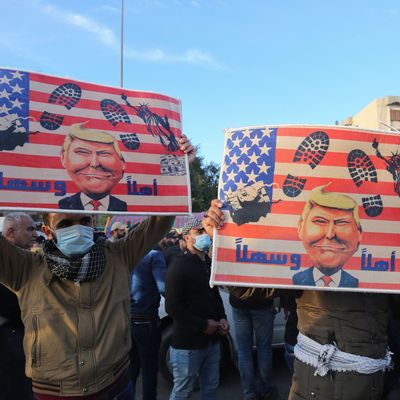
Beginning in 2011, and continuing through the next year, Donald Trump began obsessively predicting that President Obama would start a war with Iran in order to be reelected. Trump stated it publicly, on at least a half-dozen occasions, explicitly positing that attacking Iran would help Obama win reelection.
Just like Trump’s notions that Obama would direct his attorney general whom to investigate or not, or pressure the Federal Reserve to loosen the money supply in order to help his party win the next election, Trump’s attacks on Obama were the purest form of projection. They reflect his cynical belief that every president will naturally abuse their powers, and thus provide a roadmap to his own intentions.
And indeed, Trump immediately followed the killing of Qasem Soleimani by metaphorically wrapping himself in the stars and stripes. No doubt he anticipates at least a faint echo of the rally-around-the-flag dynamic that has buoyed many of his predecessors. But Trump’s critics need not assume he will enjoy any such benefit, and should grasp that their own response will help determine it.
One salient fact is that it’s not 2001, or even 2003. A poll earlier this summer found that just 18 percent of Americans prefer to “take military action against Iran” as against 78 percent wanting to “rely mainly on economic and diplomatic efforts.”
It is in part due to public war weariness that Republicans have sworn repeatedly, for years, that they would not go to war with Iran. The possibility of such a military escalation was precisely the central dispute between the parties when the Obama administration struck its nuclear deal. “Without a deal, we risk even more war in the Middle East,” argued President Obama. Republicans furiously insisted this was “absurd.” War has “never been the alternative,” said Republican Senate Leader Mitch McConnell in 2015, “It’s not this deal versus war … It’s either this deal or a better deal, or more sanctions.” The conservative Heritage Foundation argued that blocking Obama’s deal “makes the likelihood of war or a conventional and regional nuclear arms race less likely.”
And as Trump mulled following through on his threat to abrogate the deal, conservatives furiously denied that doing so would lead to military conflict. Here is former Israeli ambassador Michael Oren writing in the New York Times two years ago:
“The only alternative to the Iran nuclear deal is war.” That is what the Obama administration and proponents of the Joint Comprehensive Plan of Action with Iran claimed in 2015. Nobody in the Middle East believed that the United States would ever strike Iran, but enough Americans did that the deal went through. … The alternative was never war, but a better deal.
Oren further insisted that fears the international community would refuse to follow America’s lead by canceling the deal, and that Iran would limit nuclear inspections, would both fail to materialize. “Now they predict that the international community will not follow America’s lead in withdrawing from the deal and reimposing sanctions. Worse, they warn, Iran might use the opportunity to evict United Nations inspectors and ramp up its nuclear program,” he wrote, “All of these assumptions are false.”
In fact, these assumptions have proven true. American allies have stayed in the agreement and refused to reimpose sanctions, and Iran has started restricting inspectors and begun restarting its nuclear program.
Trump’s allies have framed the issue as being about Qasem Soleimani’s moral culpability, or Iran’s responsibility for escalating the conflict. And it is certainly true that Iran is a nasty, aggressive, murderous regime. But none of this refutes the fact that Trump’s Iran policy is failing on its own terms. Having violated a diplomatic agreement on the premise that doing so would not lead to war, they are now blaming Iran for the war they insisted would never happen.
Americans historically support their presidents in foreign conflicts, both the wise ones and unwise ones alike, at least initially. Trump no doubt believes the halo effect will last at least through November — that he might undertake an action that would harm his reelection out of some larger sense of duty to the nation or the world is unfathomable.
But presidents traditionally benefit from a presumption of competence, or at least moral legitimacy, from their opposition. Trump has forfeited his. He will not have Democratic leaders standing shoulder to shoulder with him, and his practice of disregarding and smearing government intelligence should likewise dispel any benefit of the doubt attached to claims he makes about the necessity of his actions. Trump has made it plain that he views American war-fighting as nothing but the extension of domestic politics. We should believe him.






























